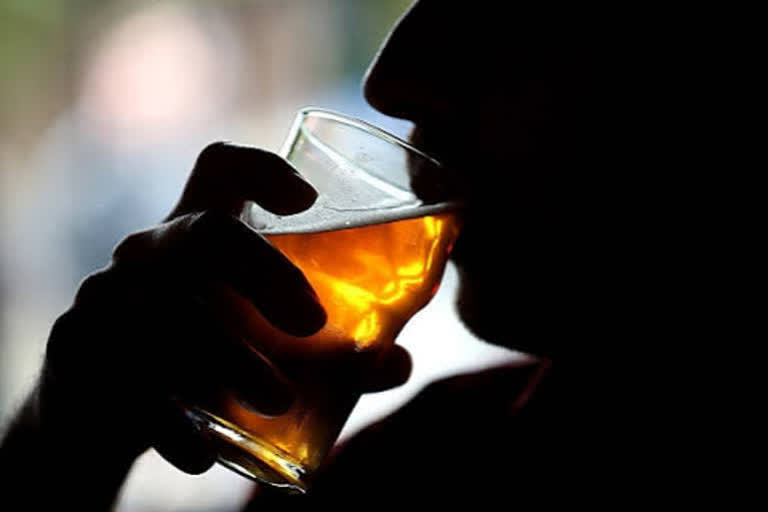Hyderabad: As the whole world finds itself in a state of uncertainty with the coronavirus outbreak, anxiety and despair are becoming very common these days. While people seek different solutions to seek solace for all their anxieties and stress, there are a huge number of people who resort to alcohol.
Statistics show that these days, many people are increasingly becoming dependent on alcohol to ease the pressure that the pandemic has been putting them through. Researchers, however, say that drinking alcohol even in moderate levels, might increase the risk of coronavirus and arterial diseases.
Harmful effect on one's immunity
Italian researchers have reported that alcohol contributes to worsening the disease's impact. "Alcohol increases the risk of viral infections and bacteria in the respiratory system. Alcohol addicts have been found to have serious lung problems. Situations are arising such that they are being forced to breathe through ventilators,” said Italian researcher Gianni Testino.
The Gianni team recently found that ACE-2 protein levels may increase at a high rate in alcoholics. Details of this research have not yet been published. However, ACE- 2 is known to contribute towards an easy entry of the virus into human cells.
Effect of alcohol on the brain
Other than respiratory ailments, alcohol also affects certain neuron transmissions in the brain. In the brain, Gamma Aminobutyric Acid (GABA) inhibits or reduces neural transmission. GABA production is increased by alcohol. Thereby, it slows down the activity of neurons. Alcohol affects glutamate production, which increases neuronal activity. This means that when someone is drunk, their body and brain slow down depending on the dose. Illusion and non-coordination occur in the person.
Read: Alcohol may put people at increased risk of coronavirus: WHO
This means that drinking alcohol can increase rather than reduce stress. If this habit persists, it can affect the promoter center of the brain. Alcohol further stimulates dopamine release. This leads to the person wanting more alcohol.
“People often drink alcohol to ease their stress. But after a while instead of decreasing the stress levels, it increases the level of stress in the person drinking alcohol,” said Prof. Michael Farrel, Professor of Addiction Psychiatry, New South Wales University, Sydney. “If stress leads to drinking, drinking leads to further pressure,” he added.
Increased sales abroad during the lockdown
During the lockdown, alcohol sales increased in many countries, including the US and Britain. Sales were up by 55 per cent this March compared to the same month last year in the US, and 22 per cent in Britain. South Africa, India, Sri Lanka and Greenland reported that though liquor stores were banned following a lockdown, consumption had not decreased. Alcohol enthusiasts who were initially outnumbered by a ban on our country due to a lockdown - have been drinking to the fullest, now that relaxations have been provided on liquor sales.
Only a minute of relief, but higher risk
'However, the ‘solace’ that people find due to the alcohol high, stays with them just for a minute. As alcohol levels start increasing in our bloodstream, the brain relaxes and then there is a certain state of delusion and excitement, which stays just for a minute or so. However, after 20-30 minutes, the body begins pumping out alcohol. When the alcohol runs out of blood, the stage of discomfort begins. The stress levels are much higher than they were prior to taking the drink. After the sedation wears off, the heights of depression and frustration reach the hilt.
Read: Six feet may not be far enough for safe social distancing: Study
Here are a few reasons why people are now getting addicted to alcohol:
- To alleviate stress arising out of the coronavirus pandemic
- To ease out of boredom due to staying at home
- To counter the pressure arising out of business risks and being unemployed
- Other possible personal reasons
Myths vs Facts
MYTH: Alcohol destroys the virus.
FACT: Alcohol works as an antiseptic only on the external body.
Consumption of alcohol does not work as it does not kill the virus that has entered into the body through inhalation of infected air, or through the nose and mouth. If people who are infected with coronavirus drink alcohol, it only increases the risk of getting affected, as alcohol decreases immunity levels. Similarly, people who drink alcohol regularly are also at increased risk of contracting the virus.
MYTH: Alcohol boosts immunity and blocks the virus from spreading in the body.
FACT: Alcohol is like a poison to immunity.
The World Health Organization recently issued several warnings on alcohol consumption in the wake of the coronavirus outbreak. Alcohol has both short-term and long-lasting effects, and it has an impact on every part of the body. WHO had further cleared many myths with regard to Alcohol consumption.
- There is no 'safe limit' on drinking alcohol. Drinking a little also can damage a person's health. It can also lead to certain types of cancers.
- Drinking too much can weaken the body's immune system. As a result, the power to fight diseases is reduced. In particular, it increases the risk of Acute Respiratory Distress Syndrome (ARDS).
- Alcohol leads to domestic violence which in turn can cause mental problems. Such cases have been reported with an increase of at least three times in China, along with a double rise in such cases in Malaysia and Lebanon, in wake of the quarantine, the WHO said. Countries like Britain, France, Spain, Japan and Italy have also reported increased domestic violence deaths.
- Suicidal tendency also develops in alcoholics.
Hence, it is very important that people try to avert the temptation of trying to find a easy outlet of stress through alcohol. Instead, care should be taken to practice healthy habits such as good food, exercise, yoga and other natural stimulants to fight the ongoing stress.
Read: Migrant commits suicide at home quarantine in Uttar Pradesh



